AAALetter - July 2019
Volume 31, Number 2
Table of Contents
-
From the Secretary/AAALetter Editor
I hope your year is unfolding well and that you enjoy this issue of the AAALetter. It is intended to share a little bit of our accomplishments thus far and offer an invitation to participate in what is ahead: Our annual conference in Denver 2020! Read More. -
From the President
This contribution marks my first as President of AAAL. For readers unfamiliar with the leadership structure of the association, the VP/Conference Chair transitions to the one-year term as President at the annual Business Meeting held during the conference. Read More. -
From the Conference Chair
While March 2020 might seem far off in the future, preparations for AAAL’s annual conference have been in full gear for many months. The 2020 conference will be held at the Sheraton Denver Downtown Hotel, March 28-31. Read More. -
Diversity Report
On this occasion, I would like to take an opportunity to offer an update on the organization’s efforts related to our commitment to diversity to the entire membership. For those who were able to join us in Atlanta at our business meeting, this is a recapitulation of what I shared in direct connection to diversity. Read More. -
AILA Report
In my role as AAAL Secretary, I represent AAAL in the AILA EBIC (Executive Board & International Committee) meeting. Each year, AILA international affiliates send their representatives to participate in the AILA international committee (IC), which gathers to advance the work of AILA. Read More. - Introducing the 2019-2020 AAAL Graduate Student Council (GSC) Steering Committee
It is our pleasure to introduce ourselves as the incoming 2019-2020 AAAL Graduate Student Council Steering Committee. We met in person at the 2019 AAAL conference in Atlanta and had our first virtual monthly meeting in May. Read More.
-
Report from the Treasurer
As Treasurer of AAAL, I am pleased to provide a brief summary on the finances and membership of our Association. Read More. -
From Public Affairs & Engagement Committee (PAEC)—Collaborating for Social Change
The Public Affairs & Engagement Committee (PAEC) is a AAAL standing committee that was formed in December 2016 that provides “an important means by which AAAL members can bring their collective expertise to bear on issues of social importance and inform public debate by speaking to issues of social and professional relevance." Read More. -
Online Education and Outreach Report
The Ad Hoc Committee on Online Education and Outreach is a newly formed committee that was convened in July 2018. It has set as its main goals the increase of AAAL’s outreach to the general public and the scholarly community, the curation of online and web-based content, and the growth of AAAL’s social media presence. Read More. - New Member Spotlight
One of the greatest benefits of joining an international organization is the opportunity to expand our social/professional network as we meet other AAAL members in support of the work we are trying to advance. This is what applied linguistics is all about as we work to address social issues. Read More.
-
Election Results
On behalf of all of us in the EC, I would like to thank the membership for participating in the 2019 elections. Read More. -
Survey on AAAL Childcare and Lactation Room Initiatives
AAAL is using the information collected in this survey to determine the need(s) for child care at the AAAL annual conference. Read More.
From the Secretary/AAALetter Editor
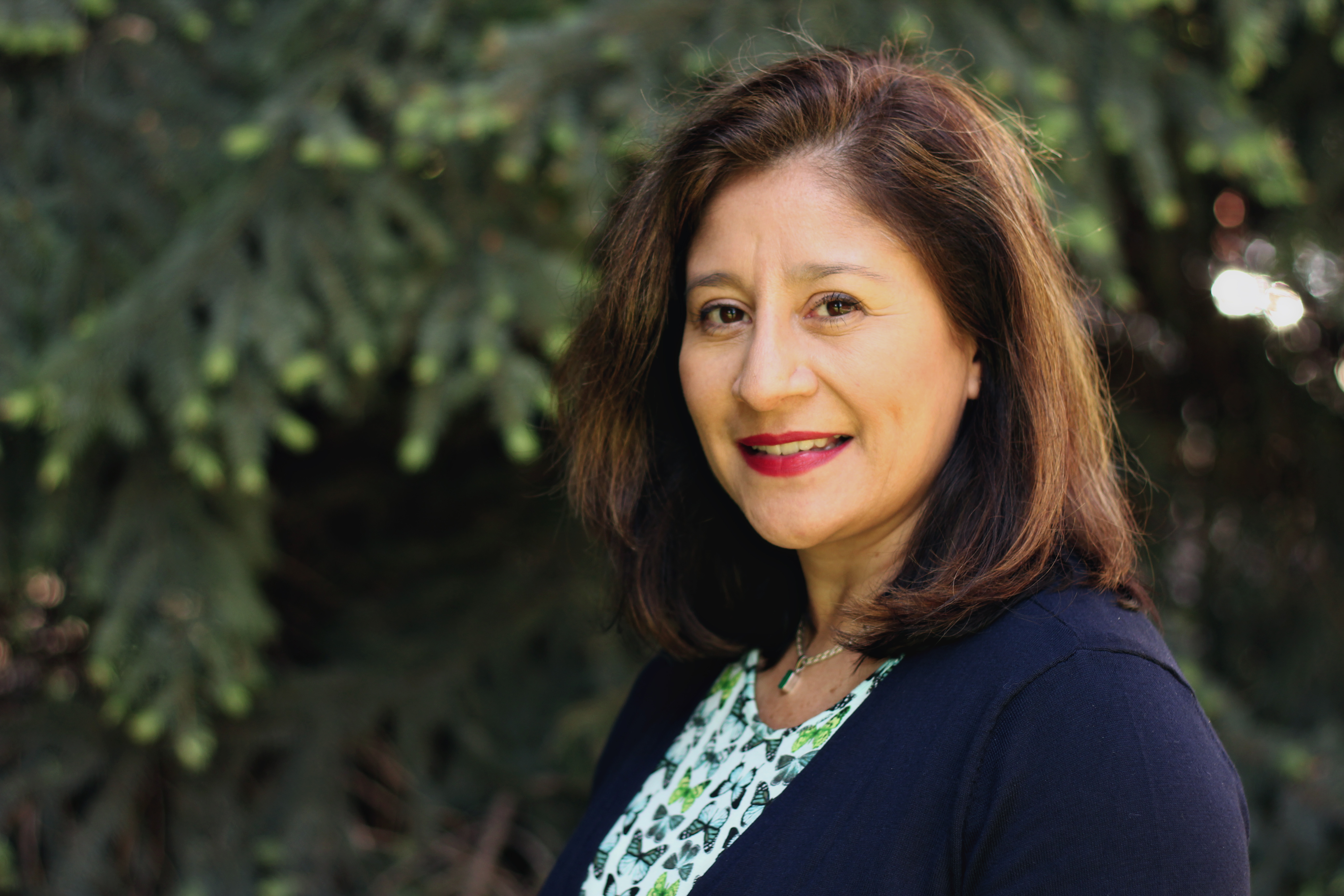
Dear Colleagues,
I hope your year is unfolding well and that you enjoy this issue of the AAALetter. It is intended to share a little bit of our accomplishments thus far and offer an invitation to participate in what is ahead: Our annual conference in Denver 2020!
First and foremost, I would like you to know that, in moving forward, the AAALetter will be issued twice a year: July and December. It will be intended to offer a recap on key accomplishments, share with the entire membership some of the key takeaways of our business and mid-year meetings, and highlight what is currently unfolding or happening in the months to come.
As a way of a brief overview, I would like to share with you that, in this issue, our President, Laura Collins, offers an update on our leadership structure. She also thanks the new members joining the EC as well as those who concluded their terms in the EC. She also presents some of the key initiatives that have been unfolding and that will continue to be central to the work she will advance in her new role with us.
Kendall King, our Conference Chair and 2nd VP, offers a great summary of what we can expect to experience at AAAL 2020 in Denver. We will be sure to continue to offer additional tips to help you make the most of your conference experience, so keep an eye on the December issue. I look forward to welcoming you to my home state! But, first and foremost, remember that the call for proposals is due this July 17, so don’t delay your submission.
In this issue, I also take the opportunity to offer greater insights into my new role as Secretary. One of my primary duties and responsibilities is to advance our work on Diversity, so there will more to come on this important initiative in upcoming months. Here I also offer an update on AILA as I represent AAAL on AILA’s International Committee. We just met at the end of June, so I present to you an update of what is happening at AILA and show what is ahead!
For those of you who were not able to join us at the 2019 Business meeting in Atlanta, this issue also offers an update on the financial health of our organization and of our membership numbers. Our Treasurer, Glenn Martinez, brings us up-to-speed with what he shared this past March. Glenn reminds us of the importance to continue to grow the FFLA (Fund for the Future of Applied Linguistics), which helps us invest in our future as an organization. Through our contributions, we make it possible for our student members to participate in our events, become full participants in our association, and shape our field. The fund depends on us, so let’s keep it growing! No contribution is ever too small. I invite you to keep on giving to the extent it is possible for you.
In this issue, you will also learn about the work of the Graduate Student Council (GSC). Here you will meet the new leaders and will learn about the wonderful work they continue to accomplish, including their plans to help us become more diverse. In addition to a report from the GSC, you will also learn about other committee work that offers opportunities for involvement, such as the work of the PAEC (Public Affairs and Engagement Committee). Furthermore, you will be introduced to the work of the Ad Hoc Committee on Online Education and Outreach!
Finally, you will read about the results of the 2019 Elections; you will also meet a new member from a distant part of our globe that is eager to connect with us on the Member Spotlight segment; and you will be invited to participate in a very brief survey we have for you to share your thoughts and input on our AAAL’s Childcare and Lactation Room Initiative. We look forward to hearing from you in this regard.
Happy reading!
Fabiola
From the President—Laura Collins
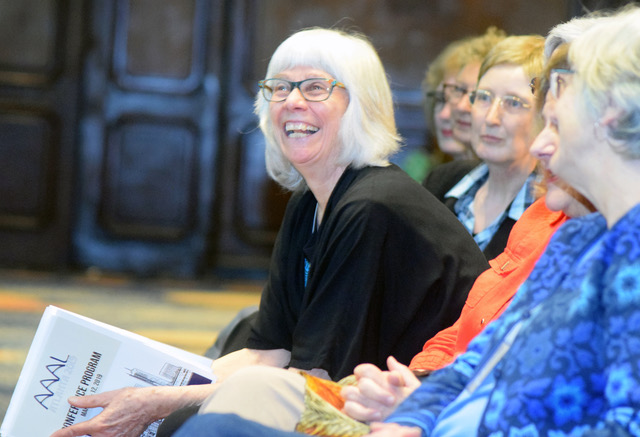 This contribution marks my first as President of AAAL. For readers unfamiliar with the leadership structure of the association, the VP/Conference Chair transitions to the one-year term as President at the annual Business Meeting held during the conference. I would like to officially welcome two executive members who also began their terms in March 2019: Member at Large Christina Higgins from the University of Hawaiʻi at Mānoa, and 2nd VP Patsy Duff from the University of British Columbia. Christina will serve a three-year term; Patsy a four-year mandate with a year term each as 2nd VP, VP/Conference Chair; President, and then Past-President. In addition, Fabiola Ehlers-Zavala from Colorado State University has now officially begun her term as Secretary (newly split from Treasurer-Secretary into two distinct roles). In the months leading up to the transition from AAAL Newsletter Editor to Secretary, Fabiola assumed the responsibilities associated with the new position, providing exemplary leadership to AAAL.
This contribution marks my first as President of AAAL. For readers unfamiliar with the leadership structure of the association, the VP/Conference Chair transitions to the one-year term as President at the annual Business Meeting held during the conference. I would like to officially welcome two executive members who also began their terms in March 2019: Member at Large Christina Higgins from the University of Hawaiʻi at Mānoa, and 2nd VP Patsy Duff from the University of British Columbia. Christina will serve a three-year term; Patsy a four-year mandate with a year term each as 2nd VP, VP/Conference Chair; President, and then Past-President. In addition, Fabiola Ehlers-Zavala from Colorado State University has now officially begun her term as Secretary (newly split from Treasurer-Secretary into two distinct roles). In the months leading up to the transition from AAAL Newsletter Editor to Secretary, Fabiola assumed the responsibilities associated with the new position, providing exemplary leadership to AAAL.
I would also like to take this opportunity to thank two outgoing executive members for their service to AAAL. Member at Large Steve Thorne contributed his broad knowledge and creative thinking to a number of initiatives undertaken by the executive during his three-year term. One example is his chairing of the task force that explored financial models for membership and conference participation that would better serve financially disadvantaged participants. This laid the groundwork for discussion and debate on the executive, ultimately leading to the adoption of a more graduated fee structure in a member vote this spring (see Standing Rule Three for the new member categories). Throughout his four-year mandate Tim McNamara’s wise counsel and equanimity set the tone for a collegial, productive executive in which divergent points of view on a range of issues were encouraged and debated with respect. Among his many contributions to the association was the introduction of a shorter paper presentation category at the annual conference, designed to encourage more discussion during sessions. This has now become a set of three linked ten-minute presentations in the new 1-hour colloquium format (see the 2020 Call for Papers for details).
The annual conference is a focal point for the association, but there is also a considerable amount of work that goes on throughout the year - indeed, at the conclusion of our two days of executive meetings in March in Atlanta prior to the conference we had 44 action items! These items include the appointment of task forces that are updating the Promotion and Tenure Guidelines and developing new guidelines for non-tenured positions. Another task force is exploring different virtual options that would allow AAAL to expand our opportunities to share research beyond the face-to-face conference, permitting wider participation from scholars who may not be able to travel to the annual conference.
There are also a number of initiatives designed to foster mentoring. These include the addition of a mentoring field to the database in the searchable member directory so that junior scholars can search for people willing to serve as mentors, and the inclusion of questions on diversity to the member join/renewal forms. In addition, the Ad Hoc Committee on Conference Connections, chaired by Peter de Costa, is preparing a set of recommendations for policies and procedures that will allow AAAL to create a Standing Committee that will oversee this highly successful pairing of senior and junior scholars at future conferences (over 100 "connections" were made in Atlanta 2019). This attention to mentoring also extends to the executive itself. Sarah Burke has developed a comprehensive Executive Committee Orientation session for new members to the executive. As both the association and the annual conference have grown considerably over the past few years, we have realized that we also need to provide more apprenticeship and support to the Conference Chair and President. We are implementing a number of procedural and structural changes to achieve these goals - more on that in the next newsletter! And of course, there is the extraordinary work that the Graduate Student Council has been doing, through professional development and networking sessions both at the conference and throughout the year, using webinars, their newsletter, social media communications and much more.
Now that AAAL has a new website platform, we are eager to make better use of online resources to communicate and showcase the work of the association. A new Standing Committee, chaired by Carolin Fuchs, has been appointed to address Online Education and Outreach. Their mandate includes managing web site and social media content and overseeing professional development (webinars, podcasts etc.). I would also like to draw your attention to two new features on the website: the recordings of the plenary talks from Atlanta 2019 (available to members) and Applied Linguists in the News - with Kendall King providing the first contribution. We look forward to featuring more examples of how our work reaches diverse audiences, across different media (TV, web- or print-based articles; blogs etc.) Click here for submission guidelines.
For those of you for whom this newsletter is arriving in summer, best wishes for some well-earned vacation!
From the Conference Chair—Kendall King
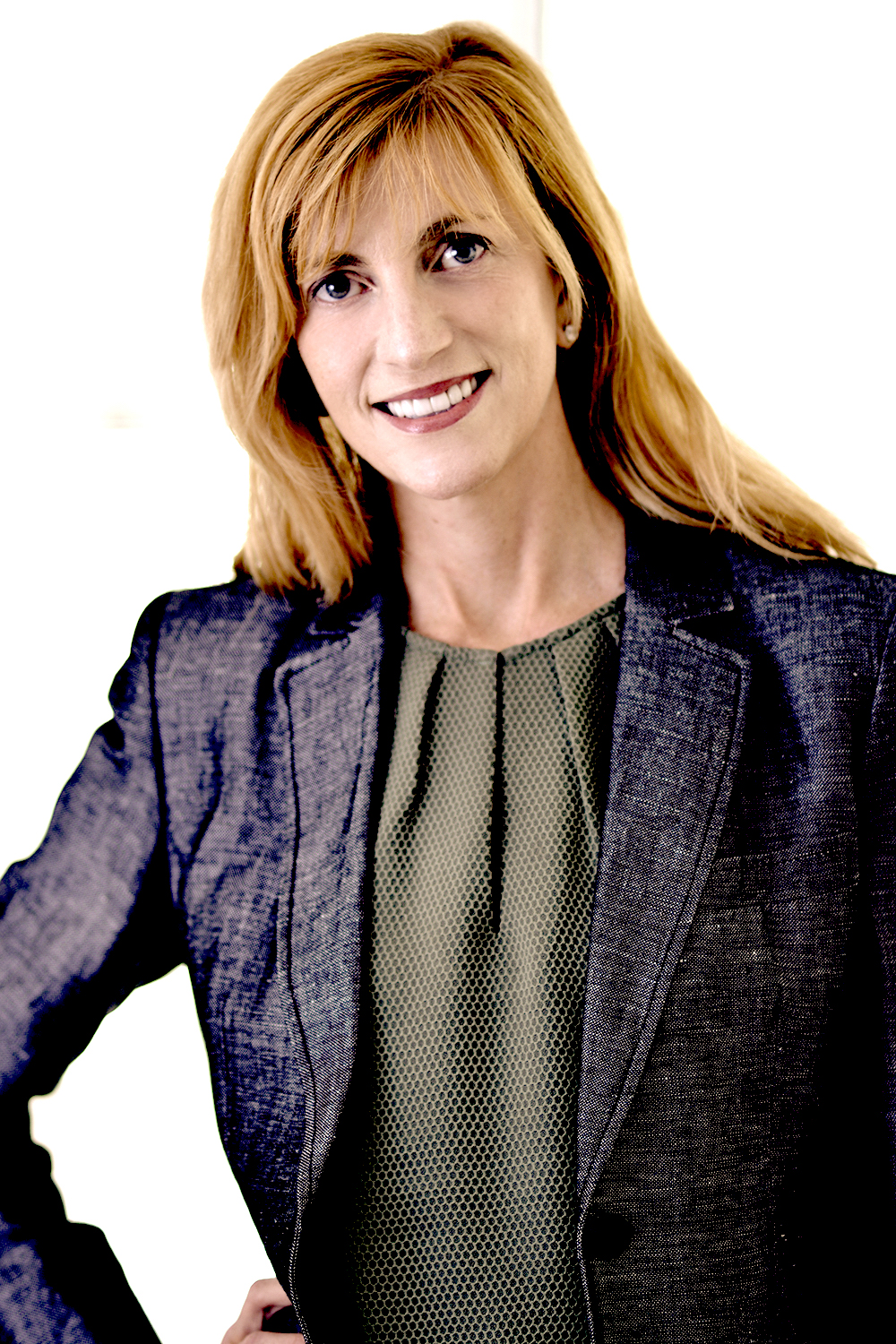 While March 2020 might seem far off in the future, preparations for AAAL’s annual conference have been in full gear for many months. The 2020 conference will be held at the Sheraton Denver Downtown Hotel, March 28-31. Here’s the news you need to know:
While March 2020 might seem far off in the future, preparations for AAAL’s annual conference have been in full gear for many months. The 2020 conference will be held at the Sheraton Denver Downtown Hotel, March 28-31. Here’s the news you need to know:
First up: we have assembled an exciting, forward-looking line-up of plenary speakers and invited colloquia. The conference theme, Looking Back and Moving Ahead, underlines the importance of seeing clearly where we have been as a field and moving ahead, with clear 20/20 vision, as an organization as AAAL continues to advance knowledge within applied linguistics and contribute to real-world problem-solving and greater social equity. Outstanding, field-leading plenary speakers this year include Mileidis Gort on biliterate writing in early childhood; Alison Mackey on new methods and findings in cognitive-interactionist second language acquisition; Onowa McIver on Indigenous language revitalization, Suhanthie Motha on decolonizing applied linguistics; and Deb Roy on physical-digital networks for better public dialogue.
A talented groups of colloquia organizers will bring together a range of cutting-edge perspectives on current work in their respective areas. Conference goers can look forward to panels organized by Patricia Baquedano-López (on race, language, and place in transregional settler colonialism); Hyeonjeong Jeong and Ping Li (on the opportunities and challenges of neuroscience for second language acquisition); Judit Kormos (on learning languages by individuals with specific learning difficulties); Annelies Kusters (on semiotic repertoires); Meg Malone and Shondel Nero (on ARAL, our association’s journal, at 40); Sheilah Nicholas (on ancestral stories in language reclamation work); Job Schepens, Frans van der Slik, and R. van Hout (on degrees of difficulty, typological distinctions, and linguistic distance), and a joint AAAL-ILTA colloquium lead by Helen Slatyer (on construct validity in interpreter testing).
Second: Denver is a beautiful city, defined by outstanding art, nature and food. The conference will be held downtown. Award-winning restaurants and the 16th Street pedestrian promenade mile are within steps of the conference hotel. Fabulous local dining options can be found nearby in Larimer Square, South Pearl Street, and neighborhoods such as the River North Art District (‘Rino’ for locals). The architecturally recognized conference hotel is also within walking (or bike-sharing) distance to the Museum of Contemporary Art, the Kirkland Museum of Fine & Decorative Art, and Denver Botanical Gardens. Slightly further afield are Mount Evans Scenic Byway, Red Rocks, and Rocky Mountain National for possible day trips, before or after the conference. Participants can also look forward to a downtown, off-site evening social event, generously hosted by the University of Colorado Denver as well as an off-site networking event, known as a ‘Sobremesa’ for scholars of color and allies.
 Third and most crucially: the submission deadline has been moved up by about a month relative to previous years. All proposal submissions must be received by July 17 (4.00pm. U.S. Eastern Standard Time) to be considered. This change was made in part to better accommodate our many international participants who need to receive acceptance notifications several months prior to the conference to apply for entrance visas. While we realize all change presents challenges, and no time is ideal for all members, we believe this shift in our annual timetable will help all members in planning their participation in future years.
Third and most crucially: the submission deadline has been moved up by about a month relative to previous years. All proposal submissions must be received by July 17 (4.00pm. U.S. Eastern Standard Time) to be considered. This change was made in part to better accommodate our many international participants who need to receive acceptance notifications several months prior to the conference to apply for entrance visas. While we realize all change presents challenges, and no time is ideal for all members, we believe this shift in our annual timetable will help all members in planning their participation in future years.
I’d like to thank Laura Collins and her entire team for providing excellent guidance and support as we approach this intensely interactive and exciting event we know as the annual conference. Thank you as well to our conference advisory team, Drs. Sofia Chaparro, Lyn Fogle, Andrea Revesz, and Manka Varghese, for their terrific insights and invaluable help in putting together the Denver program. The ‘on-the-ground’ work of conference organizing is supported by an excellent team of Ph.D. students: Lauren Truman, Margaret Buchanan, Mengying Liu, and Saem Heo (University of Minnesota).
Again, please be sure to review the call for proposals and to submit your paper, colloquium or roundtable abstract prior to July 17. We very much look forward to welcoming you to Denver in 2020!
From the Secretary—Diversity Report
On this occasion, I would like to take an opportunity to offer an update on the organization’s efforts related to our commitment to diversity to the entire membership. For those who were able to join us in Atlanta at our business meeting, this is a recapitulation of what I shared in direct connection to diversity.
As you know, the Secretary position resulted from the split of the Secretary-Treasurer position, which was approved by the membership in 2018 and noted in the changes to our Bylaws. One of the duties of the Secretary is to “oversee diversity for AAAL, ensuring that a diversity segment will be a compulsory item on every in-person EC meeting agenda and included in each issue of the newsletter, and monitors to ensure that diversity and equity are implemented in all aspects of AAAL activities.” (For more information, please refer to Standing Rule 6 under “Duties of Members of Executive Committee.”) Therefore, in moving forward, the AAALetter will have a dedicated space for addressing diversity issues.
As reported at the Business Meeting in Atlanta, here are examples of initiatives undertaken by the EC to address expressed concerns by the AAAL membership:
- The EC published an Open Letter regarding Diversity (Jan. 2019 issue).
- The 2019 Conference’s Theme was chosen to be in alignment with the Year of Indigenous Languages, and a number of sessions on the topic were part of the conference program.
- The PAEC (Public Affairs & Engagement Committee) has become a regular contributor to the AAALetter, and this initiative has offered an additional space (i.e., through the work of the committee) to AAAL members to contribute to matters of diversity and/or diversity initiatives.
- The Family Friendly Policy was also established to make it possible for our members who needed additional support to participate at our annual meeting.
- The Ad Hoc Mentoring Diversity Committee put forward a set of excellent recommendations on how AAAL can augment its mentoring activities to foster diversity in the association and in our field.
- This year, during our annual meeting, members of minoritized and underrepresented groups gathered at the “Sobremesa Event” to expand their social / support network. This event offered participants with a great opportunity to socialize and nurture professional relationships while sharing their experiences.
- The EC is also undertaking the review of the guidelines for tenure and promotion, and a task force has been convened to also consider expanding the guidelines to address the case of non-tenure track faculty who pursue professional advancement.
- Of significant impact was the approval of a scaled fee structure for conference registration which was “intended to address issues of ‘socioeconomic inequalities for scholars in high and low-income countries.’” There is no question that this initiative will allow us to provide greater access to colleagues from around the world to more fully participate in the shaping of our organization as we move forward. For your information, please know that we are using the world bank classifications for low income countries. This can be accessed at: https://datahelpdesk.worldbank.org/knowledgebase/articles/906519
Last but not least, and as I noted at our meeting, the work on diversity is ongoing, but it is not exclusive to the EC. For greater and significant impact, AAAL needs the active participation and contribution of its membership in advancing our work in this area. The EC is here to help facilitate and guide this important initiative, but we need members to help us shape it in years to come. We hope that members will act on opportunities that will come their way in this process.
Finally, if you wish to offer your input to me, please contact me at secretary@aaal.org.
From the Secretary—AILA Report
In my role as AAAL Secretary, I represent AAAL in the AILA EBIC (Executive Board & International Committee) meeting. Each year, AILA international affiliates send their representatives to participate in the AILA international committee (IC), which gathers to advance the work of AILA. This year, the IC committee gathered on June 23-24 in Lyon, France, to both conduct its regular business and complete the site inspection for the World Congress to be held in Lyon in 2023. The AILA meetings were also followed and nicely complemented by the PRELA Conference. PRELA stands for Professionnel*le*s et Recherche en Linguistique Appliquée [Professionals and Research in Applied Linguistics], and many of the members of the IC delivered papers at the conference, held June 25-26, following an all-day symposium on June 24. The conference was held at the Institute Français de L'Éducation [French Institute of Education]. This year’s PRELA plenaries were given by Laura Gavioli, who is a professor at the Université de Modène et de Reggio d'Émilie (Italy) and by Anne-Christel Zeiter-Grau, who is a teacher-researcher at the École de Français langue étrangère [School of French as a foreign language] at the Université de Lausanne (Switzerland). Laura delivered a paper on “Interpreting in doctor-patient interaction: an experience in applied linguistics” and Anne’s was on “L’asile, terrain miné : défis d’une « recheche embarquée » en (socio)linguistique appliquée” [Asylum, a minefield: challenges of an "embedded search" in applied (socio) linguistics]. Some of the sessions were delivered in English; others in French. If interested in what was covered, please visit: https://prela2019.sciencesconf.org/data/pages/programme_final_site_2.pdf.
The AILA EBIC meetings were organized by Dr. Christina Gitsaki, who is a professor and research coordinator at the Center for Educational Innovation, Zayed University, Dubai, UAE. Christina serves as AILA’s Secretary. The meetings were held at the site where the 2023 World Congress is expected to take place, Lyon Congress Center (https://www.ccc-lyon.com/), a fabulous events complex that will certainly please participants and visitors. The organizer of the AILA World Congress is Nathalie Blanc who is a professor and researcher at the Institute Français de L'Éducation.
During our meetings, we covered a range of topics. AILA leaders delivered their respective reports in the areas of Management, Prosperity, Identity, and Visibility. Affiliate representatives (i.e., IC members) participated in discussions related to how to enhance the work of AILA through its various initiatives. Affiliate members were also encouraged to provide input to AILA on the kind of support they would appreciate having from AILA. AILA is very keen on supporting the work of affiliates around the world, so AILA President Daniel Perrin invited us to share our thoughts and requests to AILA, which led to a very productive discussion. For more information on what the AILA IC as well as the EB discussed in Lyon, please sign up for the AILA newsletter at https://aila.info/contact/newsletter/. The current newsletter offers a detailed update on the work we addressed in Lyon.
Of significant interest for individuals whose papers have been accepted, but do not receive institutional support to attend the AILA World Congress are the Solidarity Awards. These awards are intended to make it possible for participants to attend the Congress. There are two kinds of awards: Full awards (travel costs, accommodation and conference fees) and travel awards (for reasonable travel costs and conference fees). For specifics, please visit https://aila.info/about/solidarity_award/
At the AILA EBIC meetings, participants were also updated on progress towards the upcoming World Congress, AILA 2020 in Groningen, The Netherlands, (August 9-14), by two members of the organizing committee in attendance at the meetings in Lyon: Kees de Bot and Marjolijn Verspoor, both from the University of Groningen and the University of Pannonia in Hungary. They were very pleased with the response to the new format for the World Congress, and announcements on acceptances of the symposia proposals were issued in late June. The AILA 2020 theme is “The dynamics of language, communication and culture in a changing world.” For more information, please visit: https://www.aila2020.nl/.
Introducing the 2019-2020 AAAL Graduate Student Council (GSC) Steering Committee
It is our pleasure to introduce ourselves as the incoming 2019-2020 AAAL Graduate Student Council Steering Committee. James Coda, University of Georgia, and Nicole Deschene, New York University, will serve as co-chairs; Nicole King, Ohio State University, and Andrea Lypka, University of South Florida, will serve as members-at-large; and María Ruíz-Martínez, University of Colorado Boulder, will serve as secretary. We met in person at the 2019 AAAL conference in Atlanta and had our first virtual monthly meeting in May.
 |
 |
 |
 |
|
| Nicole Deschene New York University |
James Coda University of Georgia |
Nicole King Ohio State University |
Andrea Lypka |
During the 2019 AAAL Conference in Atlanta, the GSC hosted three events for graduate students: a graduate student meet-and-greet on Friday, March 8th; a graduate student lunch event on Saturday, March 9th; and a graduate student dinner event on Monday, March 11th. The lunch event on Saturday, March 9th, “Utilizing Your Networks for Publishing and Job Hunting,” featured scholars from various institutions and offered tips for publishing and job searching. The graduate student event on Monday, March 11th, “Preparing a Winning Professional Portfolio,” provided attendees with information on developing a portfolio that is suitable for the job market. For the 2020 Conference in Denver, the GSC intends to offer similar events that will suit our graduate students’ needs.
Moving forward, one of our goals is to further the diversity initiative of AAAL within the GSC. While we are working through what this might look like or be, we encourage our fellow graduate students to provide your input related to increasing diversity within our organization as well as in the various events that we offer to our graduate students. To start, we will be creating a diversity sub-committee aimed at increasing the participation of graduate students from culturally diverse backgrounds and from a range of institutions and geographical regions. We will start recruitment efforts this summer.
The thematically-organized newsletter will be issued once in the fall and once in spring to convey different aspects in the journeys of graduate students in the field of applied linguistics into the academy or other professional spaces. The call for the fall issue will be out in July. We are starting to plan the graduate student events for the 2020 AAAL Conference in Denver. In order to plan meaningful graduate student events, the members of the GSC will review the survey results from the lunch and the dinner events from the 2019 AAAL conference; on these surveys, both panelists and participants indicated suggestions for future events. Thus, the interests and needs of the AAAL graduate students will steer the planning process of the coming year’s events. Further, the diversity initiative within AAAL will be present across the manuscripts selected for the newsletter and the graduate student events planned for the conference; both of these tasks will be designed to support all graduate students within the AAAL community.
Based on a recent needs assessment by the GSC, the new social media sub-committee team plans to continue developing ongoing professional development initiatives, such as the monthly YouTube videos and blog posts and collaborate with similar organizations on future projects. We will also select topics for the upcoming three webinars. The monthly YouTube series features conversations from five to ten minutes in length with faculty and graduate students related to diversity initiatives, publishing research projects, mentoring, and going on the job market among other topics. One of our other goals is to produce monthly blog content related to the upcoming AAAL conference and GSC events. By June 15th, we will also distribute a new survey for pre-conference workshops, webinars, and future events.
If you have any questions, suggestions, or feedback for the GSC Steering Committee, we value your input and take your concerns seriously! Please never hesitate to contact us with issues big or small: aaalgrads@gmail.com. To stay up-to-date with what the GSC is planning, we encourage you to follow us on our social media outlets on Facebook, Twitter, and Instagram, all @AAALGrads, and to visit our website, aaal-gsc.org.
Report from the Treasurer—Glenn Martinez
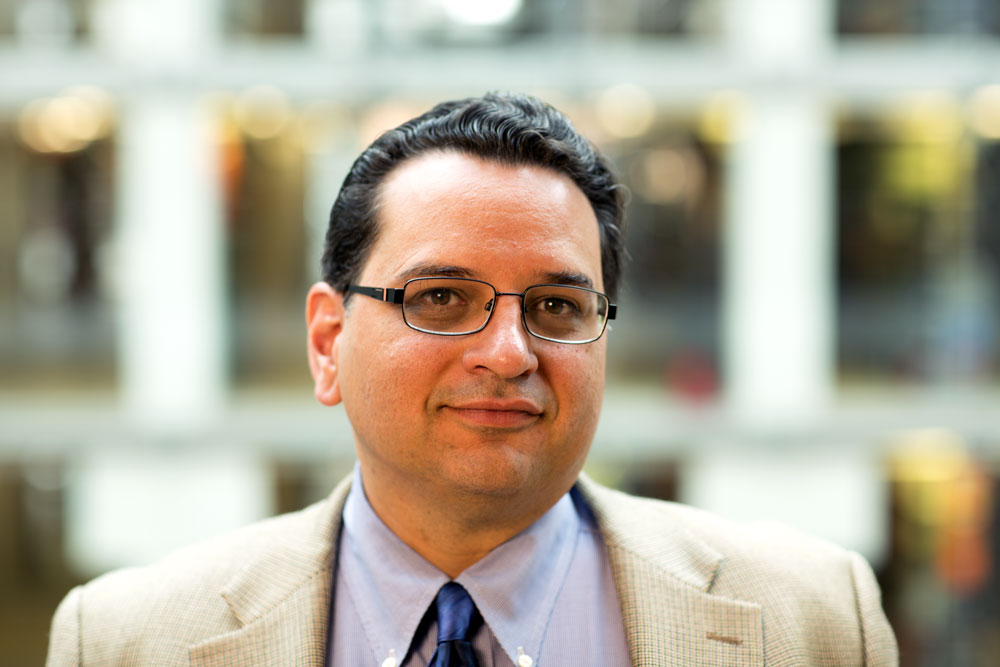 As Treasurer of AAAL, I am pleased to provide a brief summary on the finances and membership of our Association.
As Treasurer of AAAL, I am pleased to provide a brief summary on the finances and membership of our Association.
Our financial position remains strong and we continue to meet our reserve goal of a minimum of one year in operating expenses. Our total current assets stand at over $1 million inclusive of operating cash, association investment accounts and the Fund for the Future of Applied Linguistics (FFAL) endowments. We experienced a slight decline in our investment accounts in 2018 due to market volatility. It is our expectation that much of this loss will be recuperated as markets continue to stabilize in 2019.
Our income is generated from three primary sources: membership dues, conference income, and investment income. In 2018, our membership dues generated $184,901, conference registration fees generated $348,179, and investment income yielded -$41,575. Membership dues were down roughly $4,000 from 2017 and up $25,000 from 2016. Our conference registration fees were down roughly $14,000 from 2017 and up roughly $30,000 from 2016. Our investment income was $45,579 in 2016 and $81,932 in 2017. Our net income from investments between 2016 and 2018 thus stands at $85,936. We continue to meet on a quarterly basis with our financial advisor at Morgan Stanley to ensure that our investments are sufficiently diversified and to mitigate significant losses.
Association expenditures have remained stable over the past few years with the exception of conference expenditures. Conference expenditures for 2018 were higher than in past years. Our total expenditures for the Chicago meeting totaled $331,131. Expenditures in 2016 and 2017 were roughly $250,000 each year. We expect conference expenditures to return to normal as we look forward to less expensive venues in Denver and Houston.
Our membership is the single most important indicator of our impact and influence on the field. I am happy to report that our overall membership has increased by nearly 30% since 2011. Our student membership, moreover, has nearly doubled in the same time period.
The Fund for the Future of Applied Linguistics (FFAL) was established in 2000 as an endowment fund for the purpose of funding Graduate Student Awards to attend the annual conference. While our student membership has grown considerably over the past several years, the endowment has not. Your contributions, in any amount, are essential to our ability to increase the number and amount of these awards to help support our growing student membership. You can donate to the FFAL upon renewing your membership, when registering for the conference, or at any time by visiting www.aaal.org.
It is a privilege and a high honor to serve as your treasurer. Please do not hesitate to contact me, Prof. William Grabe (FFAL Trustee Chair), or any of the members of the Executive Committee if you have questions or ideas for how to improve our Association.
From Public Affairs & Engagement Committee (PAEC)—Collaborating for Social Change by Netta Avineri, PAEC Committee Chair
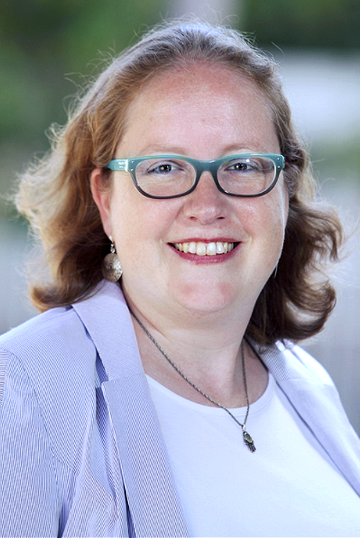 PAEC Charge and Approach:
PAEC Charge and Approach:
The Public Affairs & Engagement Committee (PAEC) is a AAAL standing committee that was formed in December 2016 that provides “an important means by which AAAL members can bring their collective expertise to bear on issues of social importance and inform public debate by speaking to issues of social and professional relevance” (AAAL Standing Rules). The PAEC is charged with engaging AAAL in the public domain. This can be accomplished by preparing and proposing position statements, processing position statements submitted by the general membership, recommending for endorsement position statements/resolutions issued by other organizations, organizing an annual public affairs event, and other outreach activities (e.g., interviews, op-ed pieces, blog posts, social media outreach, other means of communicating with the public) (AAAL Standing Rules). The PAEC provides a set of interdisciplinary applied linguistics perspectives on issues of public concern. We take a collaborative approach to initiatives, seeking to facilitate projects that are critical to AAAL members and tackle relevant social issues of the day. We also see ourselves as a resource for consultation and facilitation as AAAL members conceptualize which issues to address, why, and how.
PAEC Members:
Netta Avineri, Joel Gomez, Meg Malone, Tim McNamara, Adam Schwartz, Rachel Showstack, Rayoung Song
Accomplishments and Next Steps:
In 2017 and 2018, the PAEC focused on creating position statements, endorsing other professional organizations’ statements, participating in advocacy and social justice events at AAAL 2018 (AAAL Professional Development Session “Public Advocacy and Media Engagement: Voices from the Field”) and at TESOL 2018 (Colleague Association Session “AAAL Public Affairs and Engagement Initiative: Collaborating for Social Justice”), and building membership in the Applied Linguistics and Social Justice listserv. At the AAAL 2018 and 2019 PAEC Open Meetings, the PAEC and AAAL members explored possible outreach activities, initiatives, and projects. These include efforts in AAAL members’ local contexts; exploring connections between research and practice for diverse audiences; sharing perspectives via a range of genres, modalities, and languages; developing a writing Op-Eds webinar, collaborating with the Graduate Student Council/youtube channel, publicizing OASIS (a searchable database of non-technical summaries of peer-reviewed published journal articles, written for a non-academic audience), and AAAL collaborating with other professional organizations (e.g., AAA, ACTFL, AERA, CAL, JNCL).
How to Get Involved:
We encourage AAAL members to join the Applied Linguistics and Social Justice listserv (190 members strong), an online collaborative space for sharing ideas, resources, publications, and initiatives focused on applied linguistics and social justice.
We are currently seeking authors to write Applied Linguistics Briefs, 1-2-page resources/high-level summaries of social issues that intersect with applied linguistics. We currently have commitments from PAEC and AAAL members to write Briefs on health literacy and mock language. We are open to exploring a range of other topics that are of interest to AAAL membership and broader audiences.
We encourage you to submit a book proposal to the new Walter De Gruyter Critical Approaches in Applied Linguistics book series (contact Netta Avineri, Series Editor navineri@gmail.com for more information)
AAAL members can get in touch with ideas for projects and initiatives of social concern. Please feel free to contact Netta Avineri (paec@aaal.org) with your ideas.
Online Education and Outreach Report -- Caroline Fuchs
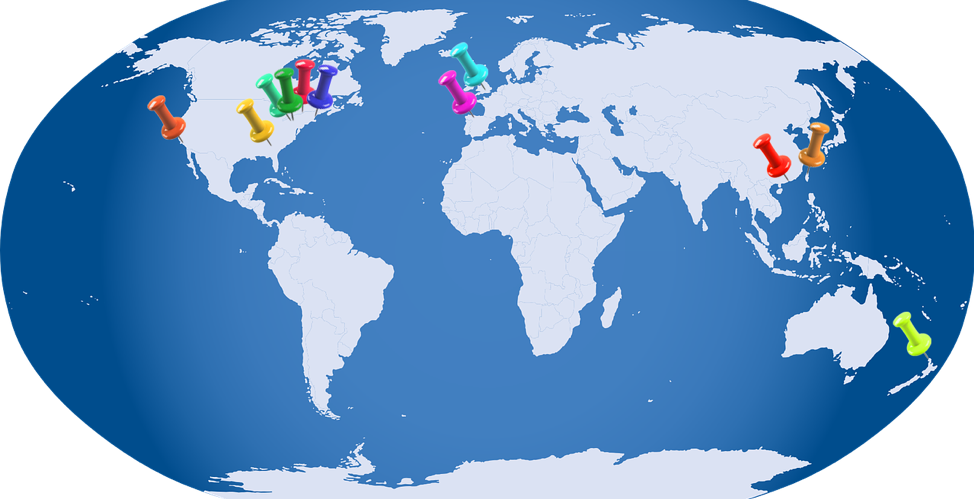
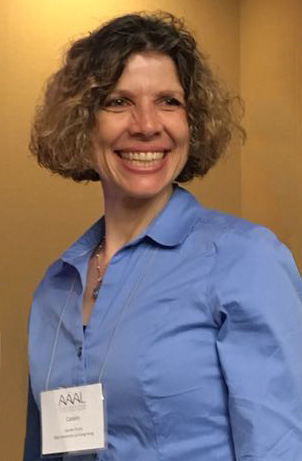 The Ad Hoc Committee on Online Education and Outreach is a newly formed committee that was convened in July 2018. It has set as its main goals the increase of AAAL’s outreach to the general public and the scholarly community, the curation of online and web-based content, and the growth of AAAL’s social media presence. Between September 2018 and February 2019, the Ad Hoc Committee held four main meetings and a number of sub-committee meetings in-between. The Ad Hoc Committee was very diverse, with different geographic member regions represented through pins in the map above, and it consisted of the following members:
The Ad Hoc Committee on Online Education and Outreach is a newly formed committee that was convened in July 2018. It has set as its main goals the increase of AAAL’s outreach to the general public and the scholarly community, the curation of online and web-based content, and the growth of AAAL’s social media presence. Between September 2018 and February 2019, the Ad Hoc Committee held four main meetings and a number of sub-committee meetings in-between. The Ad Hoc Committee was very diverse, with different geographic member regions represented through pins in the map above, and it consisted of the following members:
- Michael Amory, The Pennsylvania State University (GSC)
- James Coda, The University of Georgia (GSC)
- Sébastien Dubreil, Carnegie Mellon University
- Carolin Fuchs, Northeastern University (Committee Chair)
- Christoph Hafner, City University of Hong Kong
- Yu Jung Han, The University of Rochester
- Mirjam Hauck, The Open University, UK
- Meei-Ling Liaw, National Taichung University of Education, Taiwan
- David Malinowski, San Jose State University
- Robert O’Dowd, Universidad de Léon, Spain
- Constanza Tolosa, The University of Auckland, New Zealand
The Ad Hoc Committee’s main recommendation was to create a Standing Committee which will become permanent within the organization. This Standing Committee can be tasked with a number of initiatives such as reaching out to different AAAL members to create opportunities for staying involved (retired members, early-career members, members who unable to attend the annual conference). A survey could be conducted to determine best venues for disseminating content to members.
The Standing Committee would coordinate outreach initiatives with the Executive Committee in the area of filming plenaries for dissemination to members. In addition, interviews with plenary speakers would aim to distill a key point in relation to a speaker’s plenary session or their research more generally. Another possible outreach initiative could include building on AAAL’s existing “Conference Connections” mentorship initiative (chaired by Peter de Costa) and to offer recommendations to help expand what Conference Connection does in the future: i.e., fostering/developing relationships outside of the conference. Additionally, various interest section could be established to address a variety of research topics. For example, one such interest section could/would address the on-going need for educators to be able to implement technology in teaching (online). One specific example of an initiative to support online education could be the creation of a space for members to connect with individuals who have used technology. As part of this effort, the Standing Committee could create a peer-to-peer mentoring program to drive the adoption of new technologies.
Content for the purpose of online education and outreach could come from a number of the activities that AAAL is already engaged in, i.e., lists of funding sources that are likely to be of interest to AAAL members. This should include at least one activity that aims to build the community of those connecting to the AAAL online initiatives. Additionally, the Committee has identified a need to provide resources that can be made available to a wider (international) audience.
A specific example could be a recorded short interview series with well-known speakers answering questions like: ‘What is your key message for AAAL members at this year’s conference?’; ‘What is the one thing that you think researchers/practitioners should do differently, as a result of your research?’; ‘What advice do you have for people trying to get published in Applied Linguistics?’
With regard to increasing social media presence, the Standing Committee would work with the Graduate Student Council (GSC) and their prior efforts in the area of organizing webinars and using different social media (e.g., YouTube channels, podcast, webinars). The Standing Committee could synchronize with the GSC Steering Committee, who are in the process of piloting a YouTube channel, and to develop themes for the publication of regular YouTube videos
We encourage AAAL members to get involved when a call for volunteers for the different sub-committees goes out!
New Member Spotlight--Mauricio Véliz-Campos, EdD
One of the greatest benefits of joining an international organization is the opportunity to expand our social/professional network as we meet other AAAL members in support of the work we are trying to advance. This is what applied linguistics is all about as we work to address social issues.
With an international membership, AAAL certainly offers the opportunity to meet colleagues from across the globe. At AAAL, we are working at diversifying our membership and ensuring that we are providing access to scholars from around the world to this amazing network of outstanding professionals. If you visit our webpage, under “Membership” there is a new section called “Share your story.” Here the membership is invited to share their story about how they became involved with AAAL. Their stories may be chosen to be featured in our social media or webpage. At times, as you know and seen below, we also feature AAAL members in our AAALetter in invited pieces.
On this occasion, I would like to take the opportunity to introduce to you a new AAAL member: Dr. Mauricio Véliz-Campos. Dr. Véliz-Campos is a member of the College of Education, at Universidad de Talca, Linares, Chile. Talca (http://www.talca.com/) is a city located in the Central Valley of Chile (south of Santiago—255km/158 mi) with a population of less than a quarter million of inhabitants. You may connect with our new member through our AAAL platform (exclusive to members only) as you (or your students and/or colleagues) engage in similar research to the areas of interest of Dr. Véliz-Campos or as you wish to expand your horizons across the globe.
Following a short biographical statement, Dr. Véliz-Campos was also kind to share his thoughts on diversity and what AAAL can contribute to applied linguists around the world, with focus, of course, on Chile. Since Chile’s transition to democracy in the early nineties, the country has undergone significant changes, many of which are related to immigration and linguistic and cultural diversity.
Mauricio Véliz-Campos is an English language teacher and university professor, born and raised in Chile. He earned his doctoral degree in TESOL and Education at Exeter University, England. His research interests include the study of the various factors affecting English pronunciation learning at teacher education level, namely language aptitude, language learning strategies, and language motivation.
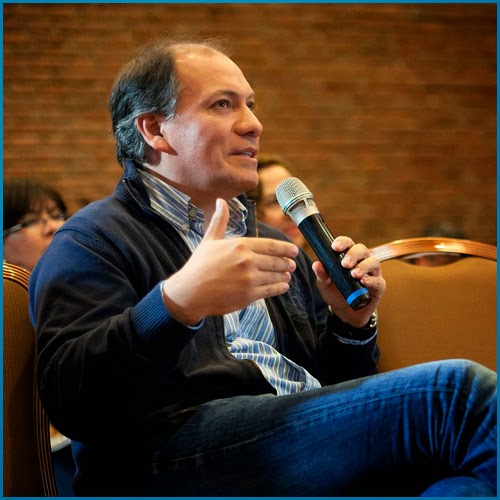 Diversity in Chile—Comments from Dr. Véliz-Campos
Diversity in Chile—Comments from Dr. Véliz-Campos
Diversity in Chile, up until the 1980s -and probably well into the 1990s, was only part of theoretical rhetoric and existed only in the personal experiences of a select few who had been fortunate enough to have lived overseas or visited other countries. After all, it was quite understandable: Chile is, to some extent, an island on land! It is geographically isolated: The Andes in the East, the driest dessert in North, the Pacific Ocean in the West, and the Antarctica in the South.
In Chile, things have changed dramatically over the past 20 years or so. Chile's political stability, economic prosperity Chile has been unfolding over the last three decades, and the greater facility of movement has contributed to a continued influx of immigrants from Haiti, Venezuela, Ecuador, Peru, Argentina, Spain, among other countries. Chile, a country of 17 million people currently has an immigrant population of more 1.3 million people. Chile's streets are now more colorful, with a greater variety of international food, served both at high-end restaurants and small street stalls; our schools and healthcare services have had to accommodate non-native speakers of Spanish--largely from Haiti- by making use of interpreters, bilingual signs and directions, training staff in Creole basics, and so forth. The need is evident: There are districts in Santiago where more than 60 percent of the local population is immigrant. This has posed major challenges: a small political movement has sought to benefit from an increased immigrant population by creating a an anti-immigrant-rhetoric, there have been isolated cases of racial violence, the economy has had to absorb a new workforce; however, it has also raised awareness about the treasure of diversity; it has allowed for education to quickly respond to a new school population, with varied needs; children are now growing up in a more diverse country where skin colors other than our own are no longer a head-turner - as was the case when I was a child; we've become more aware of a diversity that's been around us for centuries, our indigenous peoples! Chile is today a more diverse country trying hard to find its own ways to navigate rather unchartered waters.
In context as the one I describe above, I believe that AAAL can serve as a window to intercultural communication in my home country, something unheard of until very recently; it can provide us with learning opportunities to acquaint myself with how increasingly diverse countries/communities have learned to navigate the magnificent challenges of increased migration. Also, AAAL can provide us with an opportunity to access reflective discussions and informed pedagogical practices relating to the benefits and challenges that multicultural English language classes entail.
Election Results--Secretary
On behalf of all of us in the EC, I would like to thank the membership for participating in the 2019 elections. It is with great pleasure that I announce the 2019 election results as follows:
- Second Vice President: Lourdes Ortega
- Member-at-Large: Jennifer Leeman
- FFAL Trustee: Joan Kelly Hall
- Nominating Committee: Luke Plonsky, Elizabeth Miller, Andrea Revesz, and Anne Burns
- Distinguished Public Service Award Committee: Manka Varghese, and Uju Anya
- Book Award Committee: Xuesong (Andy) Gao, Judit Kormos, and John Hedcock
Here is to congratulate all members elected and to also thank those who volunteered for consideration this year.
Survey on AAAL Childcare and Lactation Room Initiatives
AAAL is using the information collected in this survey to determine the need(s) for child care at the AAAL annual conference.
Take the survey here.
